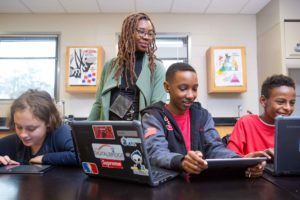
The Tools Competition is pleased to announce the 13 winners selected from 475 submissions in the Preparing for the 21st Century World track!
21st century skills are essential to succeeding in today’s world. Beyond core content areas, students must develop literacy in information, technology, and media, while building strong critical thinking, problem solving, and collaboration skills. This track sought to support students in getting “life-ready” in high-demand areas for the changing world and the competencies necessary to achieve big goals.
Winning tools in this track support learners by deepening their understanding of AI principles and applications, enhancing social-emotional learning, and understanding in-demand career pathways—all while supporting the field of learning engineering by developing unique datasets and building new features for instrumentation.
Winners of the Preparing for the 21st Century World Track
- Aiphabet School | Aiphabet, Inc. (Catalyst Award)
Aiphabet School aims to instill mathematical and algorithmic intuition of AI concepts in teenagers by providing educational resources including AI sandboxes on topics such as foundational AI algorithms using real-life examples and the interpretability and fairness of AI for critical thinking and ethical awareness about the societal impacts of AI.
- Artificial Mentors for Student-Driven Projects | Carnegie Mellon University (Catalyst Award)
Artificial Mentors for Student-Driven Projects provides personalized, reflective conversations and active elaboration with feedback exercises that students can use to refine their project proposals and explore relevant technical concepts.
- CareerInfront | Submitted as an Individual (Catalyst Award)
CareerInfront combines comprehensive self-assessment, e-learning driven by generative AI, and real-time insights from dynamic labor market sites to give learners voice and agency in their career journey.
- Clair | University of Twente (Catalyst Award)
Clair is a collaborative conversational agent designed to embed reflective prompts in group activities to foster deeper, more productive student-student dialogue—all while allowing researchers to run experiments on how AI-based support can impact learning processes.
- CurioAI Learning Companion | CurioAI (Catalyst Award)
The CurioAI Learning Companion is a software framework with a no-code interface that helps educators easily build high-quality, custom AI teaching assistants for their classes—inclusive of lecture-based, open-ended, and project-based learning.
- Bookbot: Reading Coach for Early Grades | Bookbot (Growth Award)
Bookbot helps children learn to read by listening to them read aloud, providing pronunciation feedback, and engaging in verbal conversations about stories—including by asking Socratic-style questions—across a diverse non-fiction collection of cultural, gender, and inclusive content.
- Little Language Models | CoCo | Massachusetts Institute of Technology (Growth Award)
Little Language Models is a co-creative mathematical microworld designed for groups of children to explore the powerful ideas of probabilistic thinking, modeling, and learning that lie at the core of Generative AI systems—allowing learners to easily build their own little models using their own data.
- MindHive | MindHive, New York University (Growth Award)
MindHive is a collaborative research platform to build civic science and data literacy for learners and their communities through a suite of tools to support students in developing, conducting, and analyzing their authentic inquiry projects.
- ThinkHumanTV | Affectifi Inc. (Growth Award)
ThinkHumanTV delivers evidence-based emotional skills training and assessment by leveraging popular media and integrating with major streaming sites like Netflix and Disney+.
- App Inventor Mobile Data Science Toolkit | MIT RAISE (Transform Award)
The Mobile Data Science Toolkit’s interdisciplinary K12 curriculum scaffolds students in leading real-world data science investigations—empowering learners to visualize and analyze sensor and public data using apps they build, including by accessing in-app generative AI capabilities for context and analysis.
- ImBlaze | Big Picture Learning (Transform Award)
ImBlaze makes it easy for schools and nonprofits to curate a vibrant dataset of internships/apprenticeships for their young people—leveraging AI to surface opportunities for learners and enabling schools and policy makers to refine data on what constitutes high-quality, real-world learning.
- Quandary | Learning Games Network (Transform Award)
Quandary is an online game proven to cultivate students’ ethical decision-making skills and prosocial identities, incorporating a new game engine for players, educators, and researchers to create ethical dilemmas integrated into game mechanics and deepen post-game reflection with an AI chatbot that facilitates interactive conversations.
- TUMO Learning Coach | TUMO Center for Creative Technologies (Transform Award)
The TUMO Learning Coach generates hyper-personalized learning paths optimized to achieve maximum learning outcomes for each student informed by learner feedback based on their individual preferences, attributes, and history.
Learn more about winners in all tracks here.
The Tools Competition is open to tools at all stages of development and is run over three phases with support for teams to refine their ideas. Finalists pitched their tools before a panel of judges. View judges in this track here.
To date, the Tools Competition has named 130 winners from 44 countries over four cycles. Winning tools are expected to reach more than 131 million learners worldwide by the end of 2027.
The 2023-24 Tools Competition was run with support from: Renaissance Philanthropy, Griffin Catalyst, Walton Family Foundation, Bill & Melinda Gates Foundation, Siegel Family Endowment, the Defense Advanced Research Projects Agency (DARPA), Ballmer Group, Calbright College, Axim Collaborative, Jacobs Foundation, Endless Network, and OpenAI.
Join our mailing list to receive updates on the next competition cycle—launching in September 2024!



